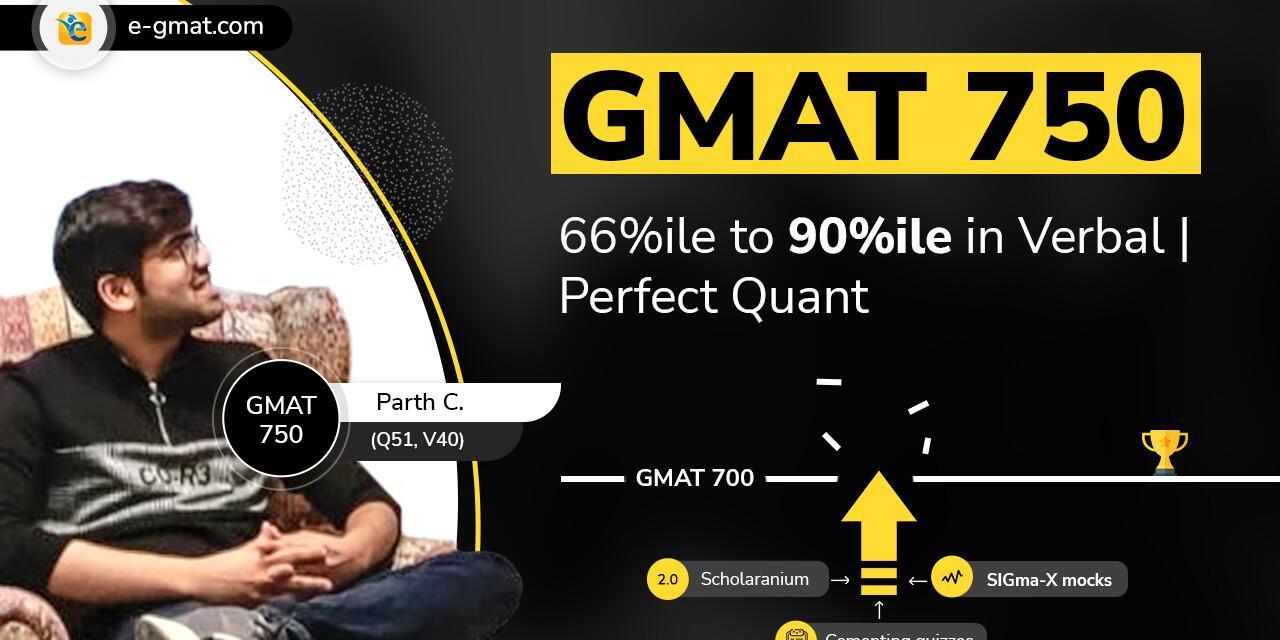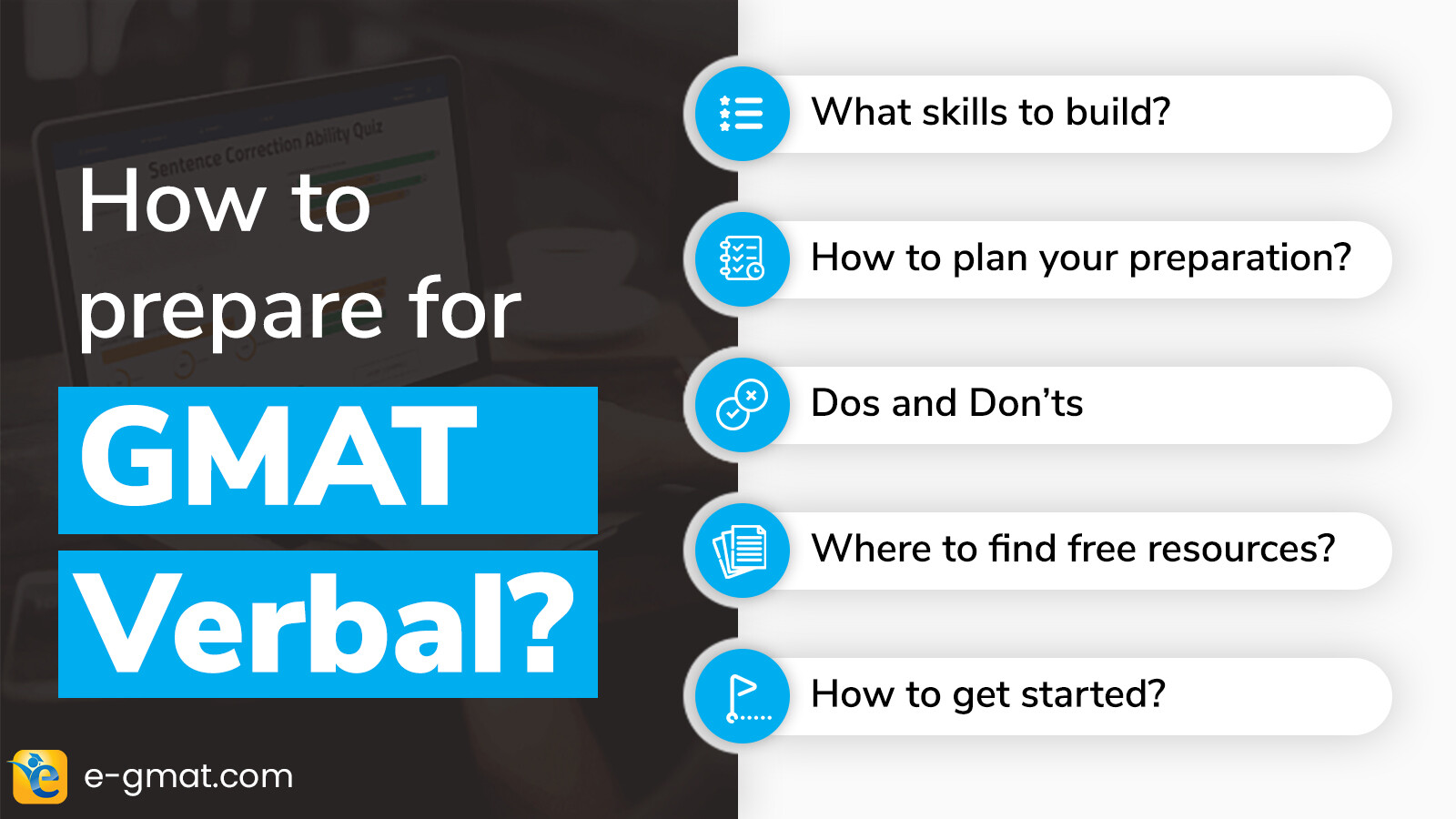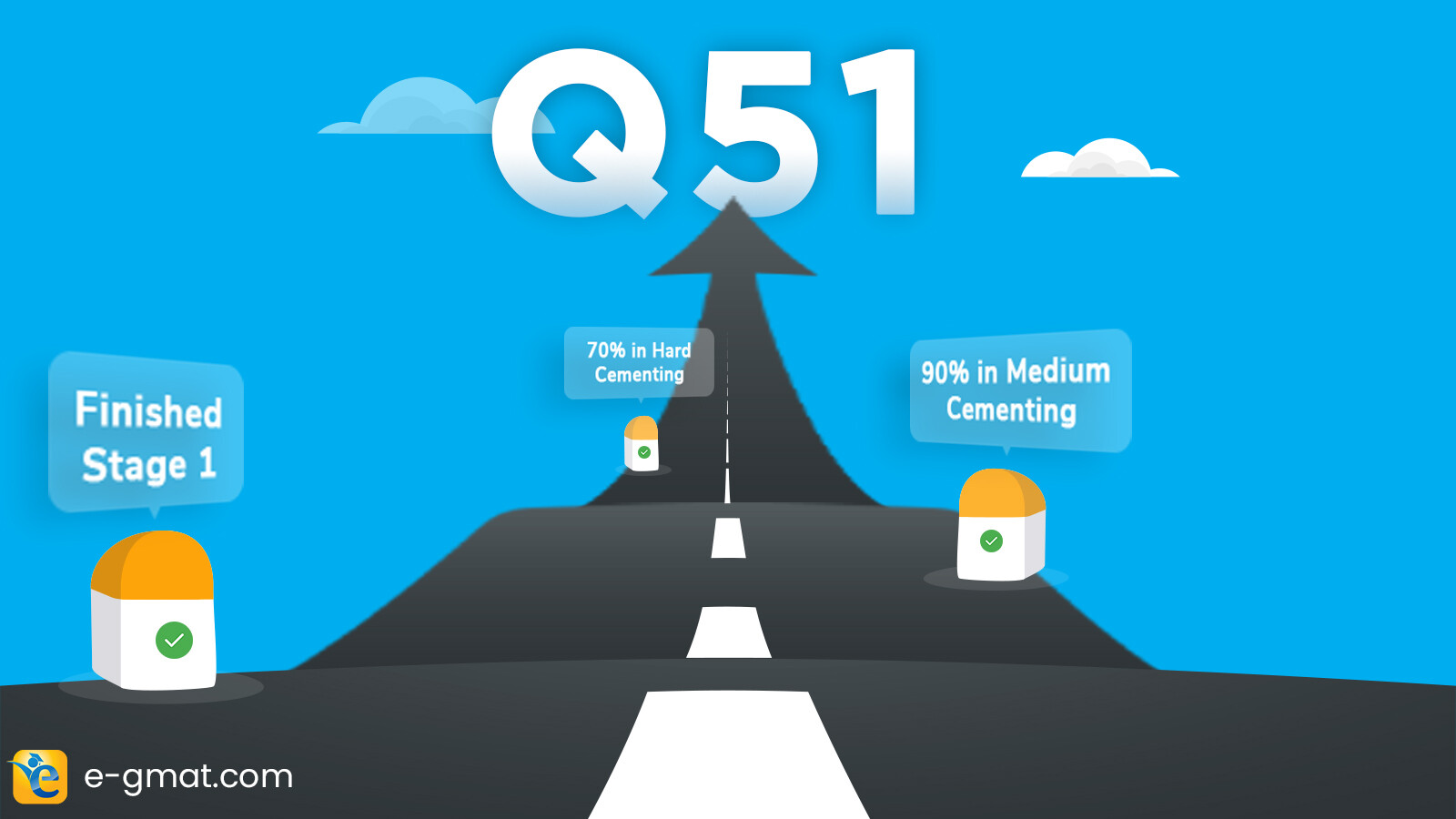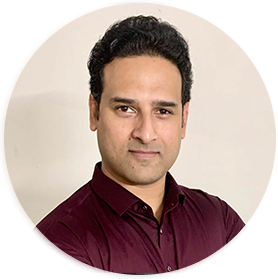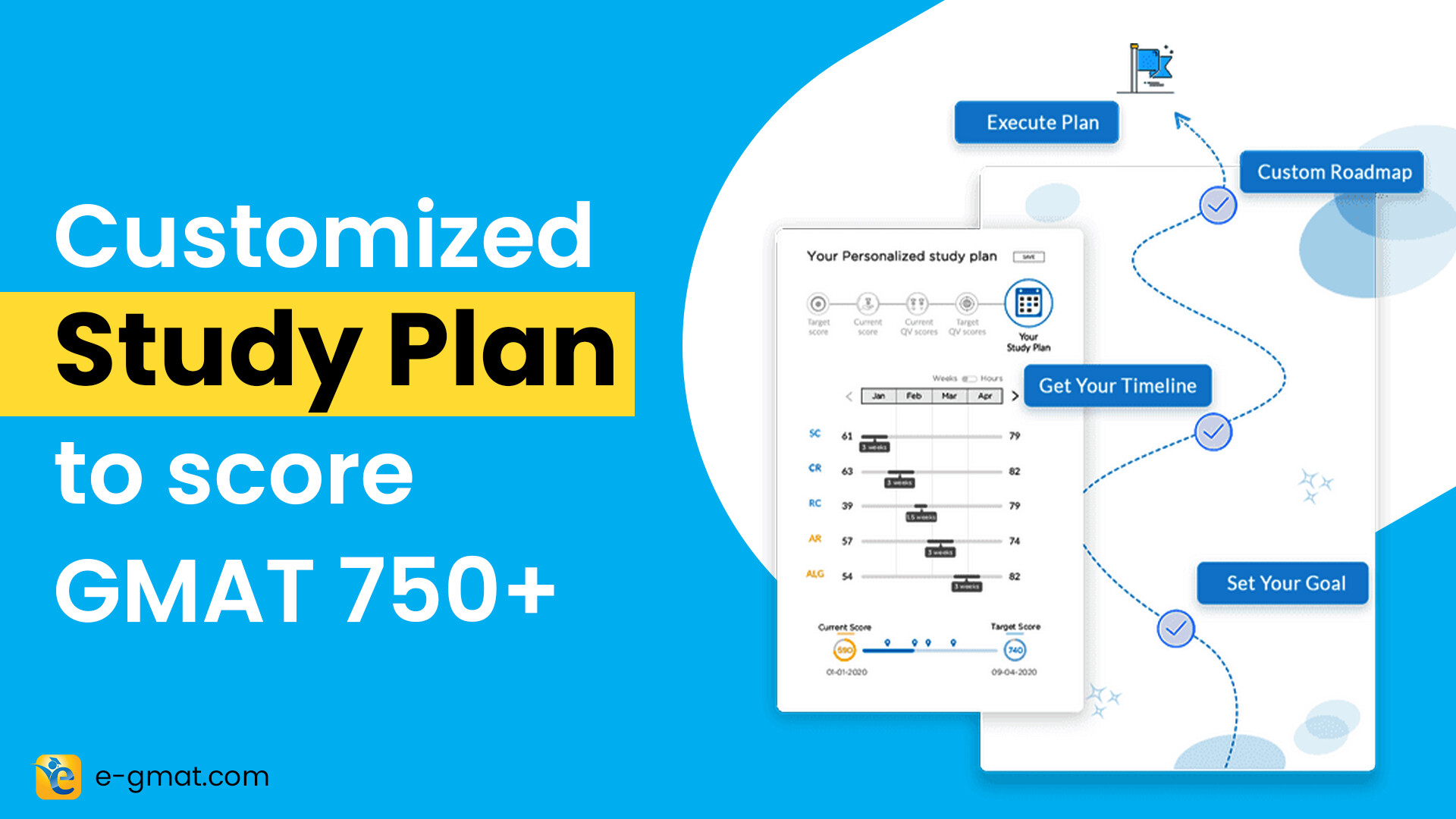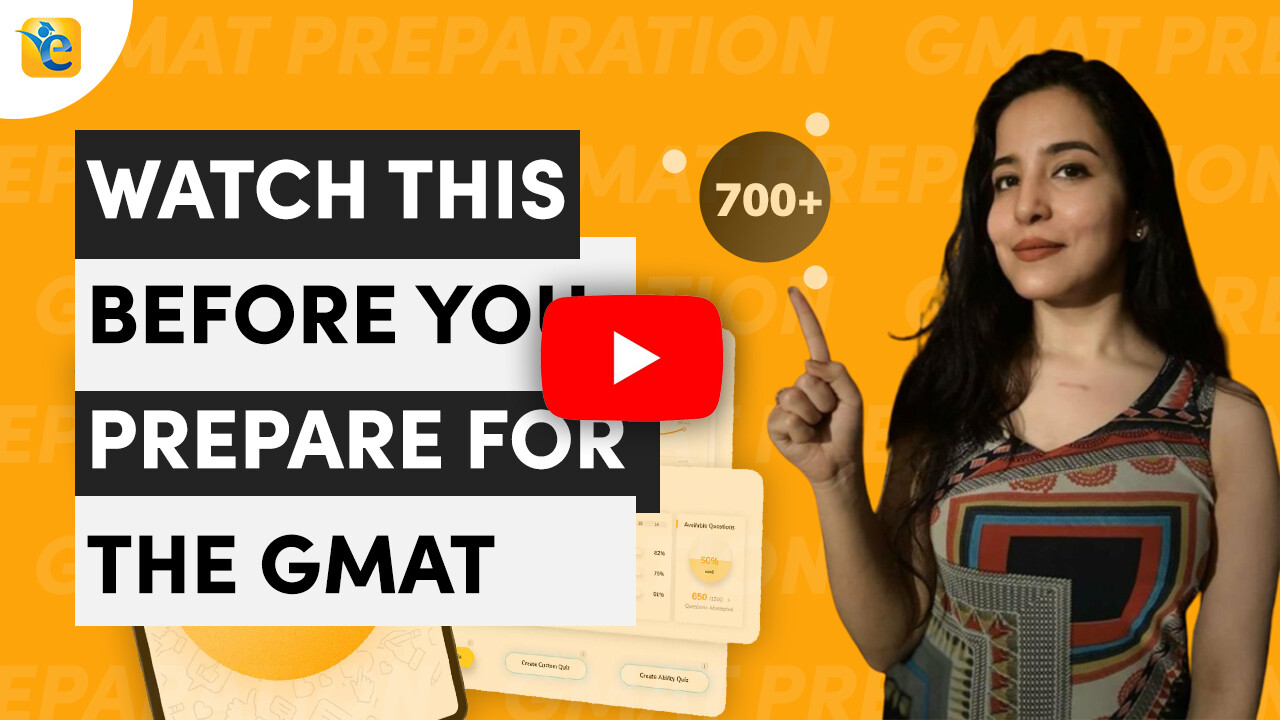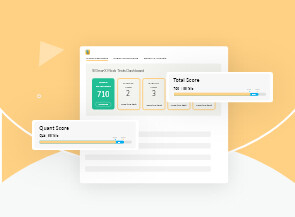Parth scored GMAT 700 on his first attempt, but to qualify for his dream b-schools, he needed to touch the 98th percentile mark. He knew the journey to every 10-point score improvement from GMAT 700 gets exponentially tricky, but he decided to not settle for anything less than a 750.
An engineering graduate from one of the top technical institutes in India, IIT Kanpur, Parth had complete confidence in his potential. While preparing for his first attempt, he realized that self-studying has limitations. He required specific strategies and guidance to improve his timing and accuracy. He realized that he needed a proper learning structure and a deeper understanding of the methods to ace the GMAT test.
After doing thorough research, Parth decided to opt for the e-GMAT course, and he committed himself 100% to his second and final inning of GMAT preparation. He optimally utilized the platform, his study time, and his aptitude for honing his GMAT verbal abilities. This approach enabled him to go from the 88th percentile to the 98th percentile.
Watch Parth’s success story to learn about his strategies to ace the GMAT.
Rajat: Congratulations on your 750. How does it feel?
Parth: It feels terrific. The e-GMAT course has greatly supported my entire GMAT prep journey. I’ve come a long way in verbal, which was my weak point. Thanks to the e-GMAT, I could crack the barrier of verbal.
Parth’s First attempt at GMAT
Rajat: You scored a perfect Q51 in both your attempts, it’s pretty hard to maintain the perfect quant score. I’ve seen people struggle to get to Q50. But the journey from Q50 to 51 is an entirely different story.
You’re an IITian (engineer); you’d find quant much easier. To get into IIT, did you take any coaching?
Parth: I took coaching at that time, but I’m more motivated by self-study, and that works most of the time for me. Especially in my college days, I’d study independently and not go to class. I self-studied for my first GMAT attempt; it was a bad mistake in hindsight.
Rajat: You were in college when you took your first GMAT attempt. What was your approach then, and how did that change with e-GMAT?
Parth: I always preferred self-study over coaching. I did not choose any course for my first attempt. My preparation was focused entirely on verbal even during that attempt. I read articles on my own, and bought books such as the OG and Manhattan’s entire GMAT series. I read through them and tried to grasp the concepts, but it didn’t work out. I prepared for two months, but the result was not up to the mark.
Rajat: What kind of effort did you put in during your first attempt?
Parth: It was significant because I took two months to study GMAT verbal. I used to give three-four hours every day to learn concepts. I read the Manhattan series entirely and took all tests I could get online, whether the official GMAT tests or all free tests.
I did not leave any stone unturned back then. But I lacked guidance in studying and grasping concepts to improve my score.
Want to score a 99%ile score in the GMAT (760+)? A winning GMAT strategy ensures you hit your target GMAT Score. Attend our GMAT strategy session webinar and get started with developing your GMAT Strategy for a high GMAT score.
Verbal preparation with e-GMAT
Rajat: That’s when you bought the e-GMAT course. You said you looked at reviews on the GMAT club, attended webinars, and liked the methodology. How did all of that change your approach?
Let’s discuss section by section, starting with Sentence Correction. What did you do in your first attempt, and how it changed in the second attempt?
Parth: In my first attempt at Sentence Correction, I focused on reading grammar rules and applying them to questions. With e-GMAT, the approach completely changed, primarily because of the cementing quizzes. There are so many different concepts in SC. If you read through a concept and move on to the next one, there’s a high probability that you might forget what you learned before and not recall it while answering questions. But cementing stage helps cement that concept into your brain. Even if you attempt a question after three weeks and you’ve not touched SC, but you’ve done the cementing right, you won’t really forget it. It’s now engraved into you.
There are so many different concepts in SC. If you read through a concept and move on to the next one, there’s a high probability that you might forget what you learned before and not recall it while answering questions. But cementing stage helps cement that concept into your brain. Even if you attempt a question after three weeks and you’ve not touched SC, but you’ve done the cementing right, you won’t really forget it. It’s now engraved into you.
Students are often confused as to how to approach GMAT SC questions and apply meaning-based method. Watch this video to learn The Meaning Based approach to GMAT Sentence Correction
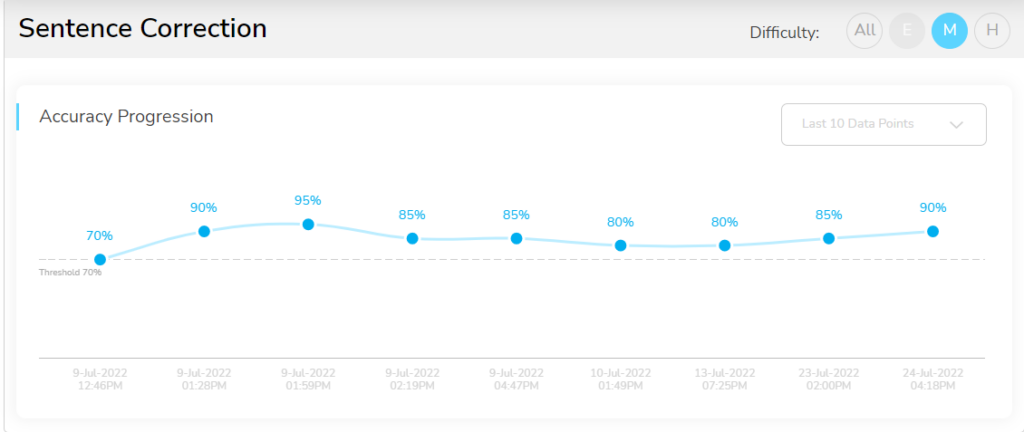
Rajat: Did you also follow the meaning-based approach in your first attempt?
Parth: I had heard of the meaning-based approach before, but I had my own raw understanding of the method. The step-by-step process I got via e-GMAT was quite helpful in understanding the approach and learning how to apply it while solving problems. So, knowing the method is one thing; being able to use it is another. But if you know the algorithm correctly, which e-GMAT really helped me understand, you can apply the method quite well.
I had heard of the meaning-based approach before, but I had my own raw understanding of the method. The step-by-step process I got via e-GMAT was quite helpful in understanding the approach and learning how to apply it while solving problems. So, knowing the method is one thing; being able to use it is another. But if you know the algorithm correctly, which e-GMAT really helped me understand, you can apply the method quite well.
Rajat: How did Critical Reasoning go for you?
Parth: I had read online articles about pre-thinking for Critical Reasoning. Those discussed that having hypotheses while reading the questions and having something in mind before actually reading the answer choices helps. But I could never apply that while solving problems.
e-GMAT’s guidance for the entire pre-thinking process was quite beneficial for me across both SC and CR. The course gave me a step-by-step approach to applying the methods.
e-GMAT’s guidance for the entire pre-thinking process was quite beneficial for me across both SC and CR. The course gave me a step-by-step approach to applying the methods. How to find that one critical assumption, and how to negate it? I could now contextualize those methods in different question types. My approach towards solving problems changed entirely.
Master the GMAT CR in just 10 days. Attend this FREE Webinar to learn Pre-Thinking to tackle 700+ level CR questions with ease. Reserve your spot by clicking here.
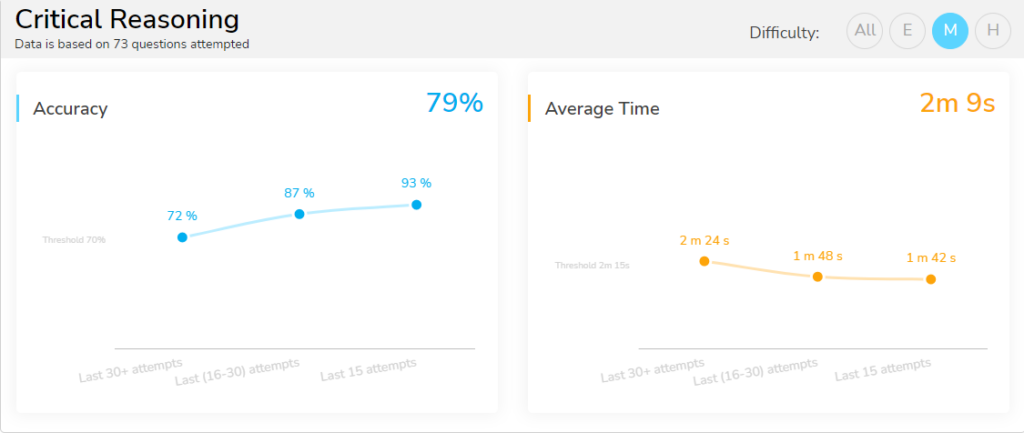
Rajat: Has that also helped you become a better reader in general?
Parth: Yes. Becoming better at CR also helped me improve my AWA score. I could write arguments more constructively and in a more structured manner. I scored a six in AWA this time. I could only manage to get a 4 on my previous attempt. I didn’t really spend time on AWA at all, but I think it automatically improved as my CR and RC skills improved.
Improving timing in RC
Rajat: Going from CR to RC, what changes did you make in RC that led to this improvement?
Parth: In my first attempt, I didn’t have a strategy for RC; it was random. I’d read passages and made notes trying to answer questions, but it took me a lot of time to answer questions.
Rajat: So, you were taking notes in your first attempt?
Parth: Yeah, but it was either too detailed where I’d write every word or too lackluster when I did not cover the essential points. Timing became a huge issue during my first attempt. I could not answer all the questions of a passage in the required timeframe, which affected my verbal performance overall because I could not finish the section in time.
Whereas during my last attempt, e-GMAT’s RC module helped me understand how to take notes very quickly and efficiently and what to capture in those notes. The entire process helped me pinpoint the relevant details, write them down and extract my answer from those notes, not requiring me to go back to the passage and reread it.
e-GMAT’s RC module helped me understand how to take notes very quickly and efficiently and what to capture in those notes. The entire process helped me pinpoint the relevant details, write them down and extract my answer from those notes, not requiring me to go back to the passage and reread it.
I also learned various techniques to solve different types of RC problems, and it helped me improve my timing significantly.
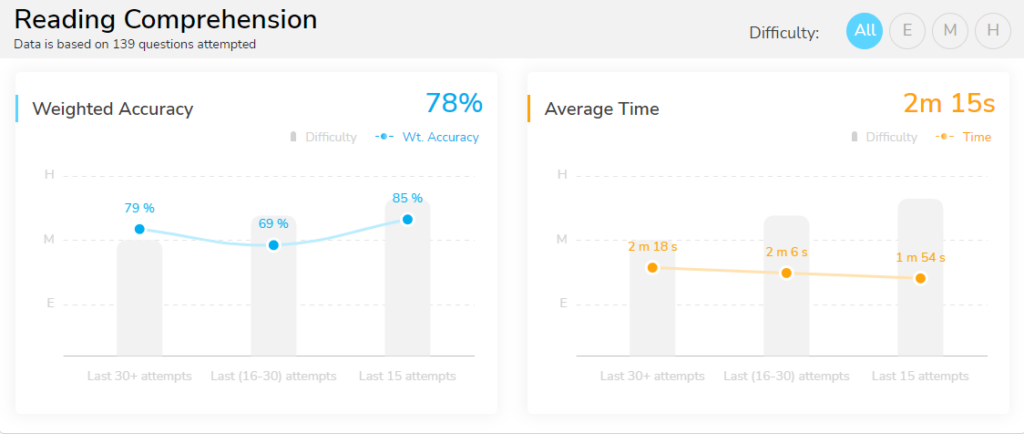
Rajat: Once you started taking notes appropriately in RC, how much time did you take to read a passage on average and to answer the questions?
Parth: I used to take 7-8 minutes to read a passage and make notes during my first attempt. After that, I’d spend at least 100-120 seconds answering each question. It really hurt my pace of solving the entire verbal section during the exam. After learning to take notes properly, those 7-8 minutes came down to 3-4 minutes to take notes and read the passage.
Given that I’d take notes quite efficiently, answering every question became a matter of 60-70 seconds’ deal. So effectively I could now solve every problem within two minutes. That really helped.
Read this article to learn all about GMAT Reading Comprehension, what it tests, the skills required to ace it, and a whole list of different GMAT RC sample questions for your practice!
Rajat: That’s significant, timesaving. And that’s where taking the right notes helps. You then focus on the transition in the passage and on identifying what the author has just mentioned versus what he is claiming. That allows you to weave through those answer choices easily.
Parth: Also filtering through any unnecessary information that might be there in the passage. You can easily ignore those distracting elements.
Practicing with Scholaranium and Mocks
Rajat: If you have to compare yourself taking the test on the first attempt and your second attempt, how confident were you when marking answers on the first versus the second time?
Parth: After going through all the concept files in the course, I took the SIGma-X mocks, and the GMAT official mocks. I scored 750-760 in those mocks, which gave me confidence that I’d definitely score around 720 or 730. But I wasn’t sure if I’ll get a 750+ or not. I knew my score would improve this time, but I did not know to what extent. Because this time, again, I didn’t focus on quant at all. I spent my entire prep time on verbal.
I was somewhat doubtful that I might not do well in quant under pressure during the exam. However, my concepts were clear, and I also had my strategies for the exam, so I tried to relax. I think being relaxed is highly critical in an aptitude-based exam like the GMAT.
Rajat: You also used Scholaranium in addition to cementing quizzes. How did you benefit from Scholaranium?
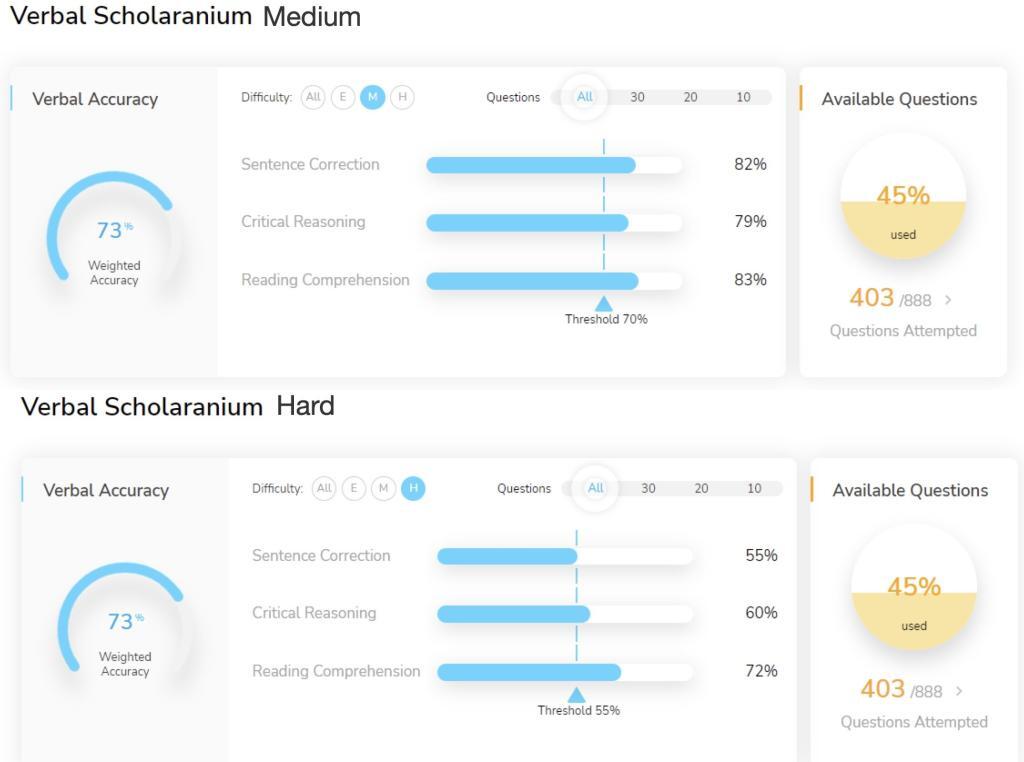
Parth: There was an entire process that e-GMAT recommends while approaching cementing quizzes. And after that, how to use Scholaranium. I actually followed that whole process, and I think Scholaranium is just a layer on top of cementing in which your concepts get finetuned for you to go from 75-80% to 90-95 percentile.
There was an entire process that e-GMAT recommends while approaching cementing quizzes. And after that, how to use Scholaranium. I actually followed that whole process, and I think Scholaranium is just a layer on top of cementing in which your concepts get finetuned for you to go from 75-80% to 90-95 percentile.
Scholaranium plays a vital role when you have the concepts cemented in your head. Next, you must train your brain to work on those concepts and techniques to apply them rigorously. Scholaranium helps in doing that.
If you are planning to take the GMAT, we can help you with a personalized study plan and give you access to quality online content to prepare. Write to us at acethegmat@e-gmat.com. We are the most reviewed GMAT prep company on gmatclub with more than 2200 reviews and are the only prep company that has delivered more than 700+ scores than any other GMAT club partner. Why don’t you take a free trial and judge for yourself?
Rajat: Did you ever write to the e-GMAT team for support for the subject matter or have doubts otherwise?
Parth: I was on a crunched timeline, and neither did I feel the need to write to the e-GMAT team for support. On the platform itself, most of my questions were answered. And the video explanations were also quite useful.
Tips for GMAT aspirants
Rajat: You took GMAT twice, and people who have taken the GMAT multiple times usually have more insights than those who take it just once.
What would you tell your fellow test takers aiming to ace GMAT, verbal specifically because quant was easy for you? What are those three things you should or should not do?
Parth: First, you should definitely have a technique while approaching the verbal section in GMAT.
You get two minutes per question for questions in quant, which is enough time, but in verbal, you have approximately 90 seconds or so to answer every question. If you don’t have a technique, you won’t be able to finish the paper and run out of time. That happens to a lot of people. If you have a technique in place, things become much more manageable.
The second thing is in continuation with the first point. The entire pre-thinking method for Sentence Correction and Critical Reasoning is extremely beneficial.
When you read a question in SC, you can easily find the errors, making it much easier to identify which options are to be eliminated. It really speeds up the process of solving problems.
Sentence Correction questions account for nearly 40% of the total questions asked in the GMAT verbal section. What does it test? Read this article to know all about it and get 25 GMAT SC Practice Questions.
Similarly, in CR, once you have the pre-thinking approach, you save time by not having to think through each option individually. With a framework in place, you can focus on finding which answer choice is the closest to your understanding of the question. Pre-thinking can increase your accuracy along with your speed in the exam.
My third point is specific to RC; taking notes benefited me greatly. When you write things down, they get quickly ingrained in your brain. If you just read through a passage, you sometimes don’t retain everything and might have to go back to it.
Your single most aim in RC should be that you don’t have to return to the passage. Once you read through it, you must be able to answer all 3- 5 questions related to the passage just by looking at your notes. So, taking good notes is very essential.
Parth’s post-GMAT plans
Rajat: What are your post-GMAT plans? Are you applying to b-schools in round two?
Parth: I’m actually applying in the next cycle, R1 2023. I have two and a half years of work experience right now. It would be better if I spent this year, got one more year of work experience, and then applied. That would set me in a more competitive pool. And also give me additional insight into the schools I want to apply to.
Rajat: Why do you want to do an MBA?
Parth: I’m working as an analyst in a venture capital firm. I talk to many start-ups and help them with fundraising and other aspects. My future goal is to start a company of my own. And for that, getting that operator experience, different perspectives, and connecting with the right alum base would be really helpful. MBA is critical to get into the right network and to restructure my career.
Rajat: You’re absolutely right. You would benefit greatly from this. What are you doing for the next eight months before you apply for an MBA?
Parth: My current focus is on finetuning my storyline, from IIT to working at Bain for a year to joining venture capital. My goal is to frame the storyline of my entire journey till now.
At the same time, I do good work at my job and perhaps create an additional impact so that I am better prepared when I apply for admission. Writing down my essays and preparing for the interview would be easier because I would have all the points in my head.
Did you know, GMAT 740 = 2X chances of admit from top B-schools and $55k+ Scholarship. Read this article to learn more about why you should target GMAT 740 score.
Rajat: Is there an area where we could help you?
Parth: If you have any consultant, you think might be helpful for me, I’d love to chat.
Rajat: I can definitely recommend a few consultants, especially given your background and what you plan to do.
Because of the fact that you still have time, I recommend applying to a couple of B schools, even in round two, so that you get feedback on your application. Maybe you can apply to schools such as Tuck, which always gives you feedback. Even if they say no, they will tell you why. Also, Darden, for two reasons, your story makes sense for that b-school, and you might also get scholarships. That would give you much more confidence going into the next round.
Parth: I think that’s quite valid. Testing out the waters and getting feedback so that I’m ready for round one next year when I apply for it. I’ll definitely consider applying in round two.
Rajat: Do you have any extracurriculars on your profile?
Parth: Yes, I do. There’s some social work I’ve been a part of social volunteering during COVID. I worked with the district magistrate of New Delhi to establish India’s largest covid hospital. Besides that, during my college days, I was involved in the entrepreneurship cell of IIT Kanpur. I was the overall coordinator, leading a large team of 150-200 students.
Rajat: The students who get excellent scores and have time for their MBA applications use it to boost that one component up. I would strongly recommend you do the same. It would be best if you had leadership in extracurriculars and it doesn’t need to be social. But it must be significant enough, not just participation. It’ll allow you to discuss what you achieved during that time. If you’re just a participant, you’re merely receiving instructions. You would want to sound like you made a change or impact.
Parth: That’s very valid. I should also focus on building that leadership aspect.


